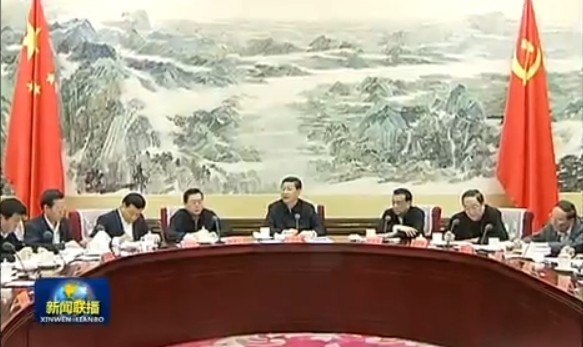

 |
| A scene of the collective study of the Political Bureau of CPC Central Committee. (File photo) |
The 30th collective study session on China's strategic priorities of economic and social development in the "13th Five Year Plan” has been conducted by the Political Bureau of the 18th Central Committee of the Communist Party of China (CPC) on Jan. 29, People's Daily reported.
Initiated on Nov. 17, 2012, the diversified study has been carried out 30 times over three years.
The significance of study
The governing strategies and related issues on the collective study have garnered high attention from both media and society.
Chinese President Xi Jinping has repeatedly emphasized the significance of study.
"The CPC attaches great attention to the study, especially for senior officials. It is a successful experience that promotes the development of both the CPC and the Chinese people," said Xi in March 2013.
Xi stressed that the correct understanding of and proper solution to the emerging problems after development is an important task. To achieve it, the only way is to improve ourselves. Study is the approach to improvement, Xi added, and we must apply what we learn to practice while improving ourselves during the practice.
What they learn?
Over the past 3 years, the study has been carried out 30 times by the Political Bureau — every 40 days, covering aspects including reform, development, social stability, domestic and foreign affairs and national defence, running the nation, party and army.
The communists have always attached significance to the basic tenets of Marxism. During the course, Marxist Philosophy has been studied twice, and basic Principle and Methodology of Marxist Political Economics has also been studied.
History-related issues are also a focus of the study, which have been part of the collective studies 5 times, including anti-corruption, the theory and practice of Chinese socialism, national governance, reviews of and reflections on the Chinese People's War of Resistance against Japanese Aggression and the formation and development of Chinese patriotism in China's history.
Awareness of problems has also been reflected in the study from perspectives of Party-building, reform deepening, economic construction, politics, culture, society and national defense and strengthening of the army.
The course lecturers are people from various professions, such as leading officials from national departments, scholars from research institutions, and also front-line staff.
Experts from different fields constitute the majority of the lecturers. For instance, the lecturers of "Anti-corruption in Chinese History" are Bu Xianqun, a researcher at the Institute of History of the Chinese Academy of Social Sciences (CASS), and Fang Ning, a researcher from the Institute of Political Science of the CASS.
Besides providing classes, the study was also carried out in the form of field surveys.
Taking the ninth study as an example, on Sept. 30, 2013, a study on innovation-driven strategy was carried out in Zhongguancun Science Park, China's Silicon Valley, in the form of a combination of survey, explanation and discussion.
 Have you ever taken these beautiful subways in China?
Have you ever taken these beautiful subways in China? Chinese beauties, foreign models meet in Chengdu
Chinese beauties, foreign models meet in Chengdu Awesome! Aerial pictures taken on J-11 fighter
Awesome! Aerial pictures taken on J-11 fighter A foreign girl explains what China should be proud of
A foreign girl explains what China should be proud of Chinese navy's air-cushioned landing craft in pictures
Chinese navy's air-cushioned landing craft in pictures Chinese pole dancing master opens class in Tianjin
Chinese pole dancing master opens class in Tianjin Splendid Sichuan after snow
Splendid Sichuan after snow College girl of Vancouver crowned Miss Chinese Int'l 2016
College girl of Vancouver crowned Miss Chinese Int'l 2016 Pentagonal Mart becomes the largest vacant building in Shanghai
Pentagonal Mart becomes the largest vacant building in Shanghai Top 20 hottest women in the world in 2014
Top 20 hottest women in the world in 2014 Top 10 hardest languages to learn
Top 10 hardest languages to learn 10 Chinese female stars with most beautiful faces
10 Chinese female stars with most beautiful faces China’s Top 10 Unique Bridges, Highways and Roads
China’s Top 10 Unique Bridges, Highways and Roads PLA takes step forward with new zones
PLA takes step forward with new zones New report examines the demographics and habits of moviegoers in China
New report examines the demographics and habits of moviegoers in China Parents turn to illegal exams to ensure their second child is the gender they want
Parents turn to illegal exams to ensure their second child is the gender they want People look for hidden bribery methods as CCDI tightens inspections over holidays
People look for hidden bribery methods as CCDI tightens inspections over holidaysDay|Week